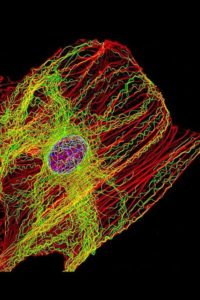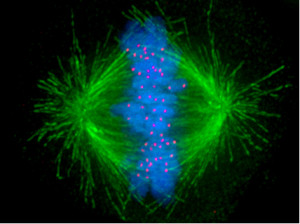spidergoat
Valued Senior Member
Quantum effects are a leading edge field in computation, so I don't see why it would work in a high temperature brain and not in a potentially super cooled compiter.
That's outside my knowledge, temperature and wetness are problematic it seems. But to compare an organic brain to a inorganic computer seems problematic just for the type of "processing" alone.Quantum effects are a leading edge field in computation, so I don't see why it would work in a high temperature brain and not in a potentially super cooled compiter.
But not equally good at processing complex information.No, all organism that have managed to survive are equally capable of surviving.
Their existence is proof of their existence, not the efficiency of the operating system, let alone the development of that system.Their existence is the proof.
Not to mention algae and fungi. But their emotive capacity is so limited as to be irrelevant to this discussion.From a survival perspective, the insect is the most successful organism on earth, aside from the bacteria.
A very, very long run, with a great many dead ends and failed attempts, and an end-product of dubious stability is not my efinition of "most efficient".... the long run.
That, too, was a blind alley. That mode didn't work for us. Again, what's flight got to do with efficiency in processing and transmitting information?Really? The insect had conquered flight some 350 million years before man crashed his first attempt at flight. And we had the birds as examples.
Not as many as nature crashed entire species of millions of individuals.How many planes did the Wright brothers crash?
Exactly. And they can't be copied, so we had to go a whole different method to achieve a similar result.We even had birds as examples and proof that flight can be copied.
Teaches us work with what you have if it works use it - very hit and miss approachI agree in principle, but also believe that the most efficient evolved complex patterns have been shaped and honed by the evolutionary process. If the human mind is an example of an efficient evolved organ and it uses electro-chemicals as its most efficient or most functional combination for complex information sharing, then that should teach us something about the combinatory richness and functionality of electro-chemical information transmission, rather than just electrical or chemical assets alone.
As above, a hit an miss approach with only a occasionally a hitThen why is it able to learn so slowly and forget so quickly, compared to a computer?
Agree, older I get I err I err I err forget err oh that's right I forgetThe human brain, in particular, is running on spaghetti code - and malfunctioning with terrifying frequency.
If the ability of birds to fly cannot be copied, does that make natural flight less effective than artificial flying machines? You seem to forget "navigation skills" as part of the natural package. The human improvisation on a theme is nothing special. Insects can fly without any intelligence at all.Exactly. And they can't be copied, so we had to go a whole different method to achieve a similar result. So it must be with a new kind of intelligence.
I'm not comparing brains to present day computers, but to the theoretical computers of the future, who's basic architecture may greater resemble a neuro-network. And furthermore, I'm suggesting that the medium of computation is irrelevant.But to compare an organic brain to a inorganic computer seems problematic just for the type of "processing" alone.
Ok. But he's just guessing.Roger Penrose postulates that a moment of "consciousness" occurs during the quantum event.
What about a computer based on light? Or a computer simulation of the conditions in a human brain, including all chemical (physical) reactions and electrical flow? Mouse brains have already been partially simulated on conventional computers, and exhibit realistic behavior.I'm not sure if this could be imitated with pure electrical stimulus.
No. It's just different. Faster, for one thing. In spite of doing it by a different method, airplanes, helicopters, drones and rockets do work. And they took a lot less time to perfect than bird flight.If the ability of birds to fly cannot be copied, does that make natural flight less effective than artificial flying machines?
Intelligent design mastered that a lot faster than natural selection, as well.You seem to forget "navigation skills" as part of the natural package.
Dandelion seeds can do it without intelligence; insects use some intelligence, howbeit of limited scope.The human improvisation on a theme is nothing special. Insects can fly without any intelligence at all.
No, that looks completely different.Is this what you are referring to?
Electricity alone has worked for several prosthetic treatments.I have a feeling that electricity is not sufficient by itself.
You could certainly argue that. However, you could make the same arguments with you - that your emotions are just deterministic bioelectrical reactions, and so you aren't really feeling emotions, just reacting to a program that evolution has prepared for you.Can't help but wonder though...will machines/robots only be able to replicate our emotions, and have no real independence of their own? Even if AI were to display emotion, would that display be little more than a deeply intricate program?
IMO, it makes all the difference.I'm not comparing brains to present day computers, but to the theoretical computers of the future, who's basic architecture may greater resemble a neuro-network. And furthermore, I'm suggesting that the medium of computation is irrelevant.
He has the credentials to make "educated" guesses.Ok. But he's just guessing.
Our visual senses are light based, our auditory senses are sound-wave based, our smell and taste is chemically based, our touch is physically sensory based.What about a computer based on light? Or a computer simulation of the conditions in a human brain, including all chemical (physical) reactions and electrical flow? Mouse brains have already been partially simulated on conventional computers, and exhibit realistic behavior.
You touched on the problem but you are not looking deep enough. You are missing the most important part, electrical wires don't do anything at all.If you had some very minor brain damage, and they could replace 10 of your damaged neurons with electrical replicas that would perform _exactly_ the same function (to the degree that you felt, thought and reacted exactly the same) - would you now "not have emotions" because part of your brain used a different underlying mechanism? How about if it was 100 neurons? A million?


Microtubules may be the brains of the cell, particularly neurons—operating like a computerized Lego set.
They are large complex scaffolding molecules that work closely with the two other rapidly changing structural molecules, actin and intermediate filaments, to provide structure for the entire cell including the spatial placement of organelles.
In neurons, microtubules respond instantly to mental events and constantly build and take down elaborate structures for the rapidly changing axons and dendrites of the synapses. Some think that microtubules are quantum computers and the seat of consciousness.
Their lifestyle is quite remarkable. A previous post described elaborate functions along the neuron’s axon including special tagging of cargoes that are transported by distinct motors with complex ancillary molecules for each type of transport

https://www.ncbi.nlm.nih.gov/books/NBK9932/Microtubules, the third principal component of the cytoskeleton, are rigid hollow rods approximately 25 nm in diameter. Like actin filaments, microtubules are dynamic structures that undergo continual assembly and disassembly within the cell. They function both to determine cell shape and in a variety of cell movements, including some forms of cell locomotion, the intracellular transport of organelles, and the separation of chromosomes during mitosis.
Right, I overlooked the term prosthetic.No, that looks completely different.
True and all current AIs run on electricity.Electricity alone has worked for several prosthetic treatments.
But where did we get the idea of flight to begin with? Someone looked up and saw a bird.No. It's just different. Faster, for one thing. In spite of doing it by a different method, airplanes, helicopters, drones and rockets do work. And they took a lot less time to perfect than bird flight.
After someone looked at flying animals and wondered where they were going, and how they knew where they were goingIntelligent design mastered that a lot faster than natural selection, as well.
And all a result of the Natural evolutionary way. You are supporting the notion that a designer is useful but certainly not necessary for the evolving complexity of life.Dandelion seeds can do it without intelligence; insects use some intelligence, howbeit of limited scope.
Being merely electro-chemical, I still have not grasped the relevance of all these attributes of life to the
necessity of basing AI on the same mechanical principle as NI. How is it proof that artificial intelligence has to be insect-like, bird-like, cheetah-like, whale-like and whatever else.
All living things are wonderful. You'll get no argument from me.
We're good at it.I wish we hadn't destroyed so many already; I wish we could stop destroying them all.
Strange, you just accused humans of that. If humans are so efficient they should know better than the mindless evolutionary functions, no?But that doesn't make evolution efficient - it sure as hell doesn't make the human brain efficient. Evolution is mindless and profligate.
Yes, but are these not the qualities humans are using in their destruction of the earth's biosphere? Shall we speed up this efficient process?efficient: - achieving maximum productivity with minimum wasted effort or expense. - preventing the wasteful use of a particular resource. - S : well organized, methodical, systematic, structured, well planned, logical, coherent, well regulated, well run, well ordered, orderly, businesslike, systematized, streamlined, productive, effective, labor-saving, cost-effective
That's what I've been saying. The human brain is not the best possible example of a thinking-machine - not the most efficient, not the most durable and certainly not the most reliable. Whatever else it may be, it's not necessarily the only possible mechanism whereby its functions might be preformed.But where did we get the idea of flight to begin with?..We're not smart, we're greedy and stupid and far from wise.
Ummmm I would put it in terms of being intelligent enough to be GREEDY STUPID AND WISE (and a few other aspects) at the same momentWe're not smart, we're greedy and stupid and far from wise
I understand your perspective, but IMO, the rest IS the important part of brainpower. The human brain is the most sophisticated multi-tasking computer in the world by far. But yes, far from perfect, if perfection is even possible.That's what I've been saying. The human brain is not the best possible example of a thinking-machine - not the most efficient, not the most durable and certainly not the most reliable. Whatever else it may be, it's not necessarily the only possible mechanism whereby its functions might be preformed.
All the other nature stuff is irrelevant.
And so there can never be another kind?I understand your perspective, but IMO, the rest IS the important part of brainpower. The human brain is the most sophisticated multi-tasking computer in the world by far.
Look around you, every living thing employs a form of computing, from the rigid chemical quasi-intelligence of bacteria to the fully intelligent but much greater flexibility of electro-chemical self-learning processes in the less rigidly constrained human brain and perhaps a few other highly intelligent animals in the oceans (the largest (71%) natural environment).And so there can never be another kind?
So? That means natural intelligence has a common origin.Look around you, every living thing...
